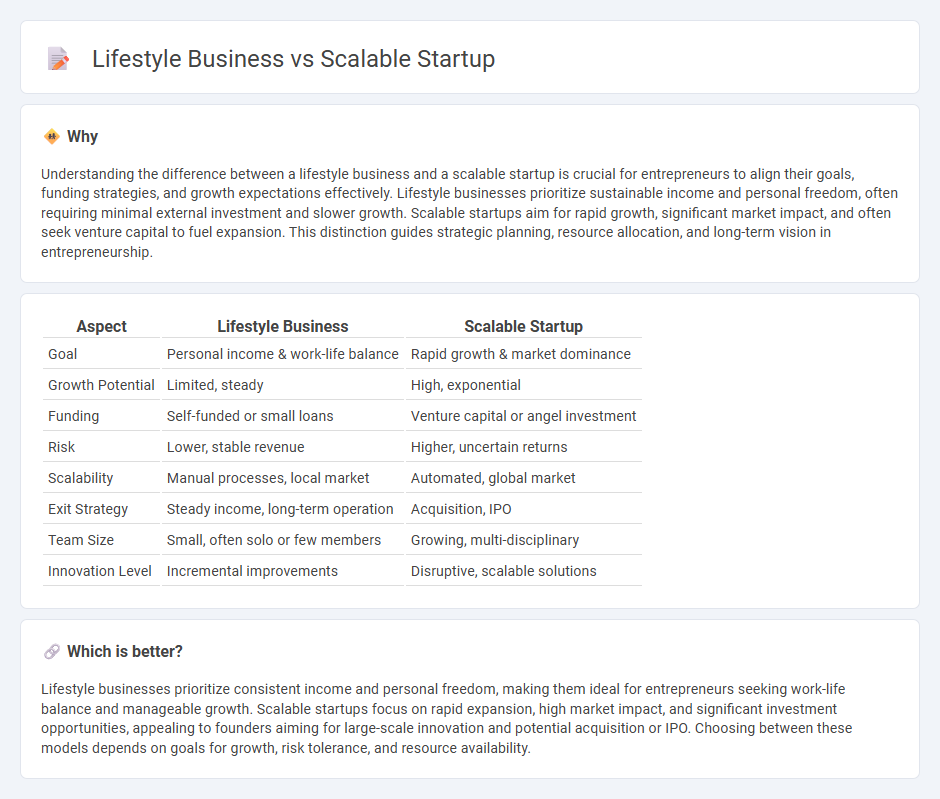
Lifestyle businesses prioritize work-life balance and consistent income, often staying small to maintain personal control and freedom. Scalable startups focus on rapid growth, innovation, and attracting investment to achieve significant market impact and high returns. Explore the key strategies and challenges that differentiate these two entrepreneurial paths.
Why it is important
Understanding the difference between a lifestyle business and a scalable startup is crucial for entrepreneurs to align their goals, funding strategies, and growth expectations effectively. Lifestyle businesses prioritize sustainable income and personal freedom, often requiring minimal external investment and slower growth. Scalable startups aim for rapid growth, significant market impact, and often seek venture capital to fuel expansion. This distinction guides strategic planning, resource allocation, and long-term vision in entrepreneurship.
Comparison Table
| Aspect | Lifestyle Business | Scalable Startup |
|---|---|---|
| Goal | Personal income & work-life balance | Rapid growth & market dominance |
| Growth Potential | Limited, steady | High, exponential |
| Funding | Self-funded or small loans | Venture capital or angel investment |
| Risk | Lower, stable revenue | Higher, uncertain returns |
| Scalability | Manual processes, local market | Automated, global market |
| Exit Strategy | Steady income, long-term operation | Acquisition, IPO |
| Team Size | Small, often solo or few members | Growing, multi-disciplinary |
| Innovation Level | Incremental improvements | Disruptive, scalable solutions |
Which is better?
Lifestyle businesses prioritize consistent income and personal freedom, making them ideal for entrepreneurs seeking work-life balance and manageable growth. Scalable startups focus on rapid expansion, high market impact, and significant investment opportunities, appealing to founders aiming for large-scale innovation and potential acquisition or IPO. Choosing between these models depends on goals for growth, risk tolerance, and resource availability.
Connection
Lifestyle businesses prioritize sustainable income and personal freedom, often focusing on niche markets and steady cash flow. Scalable startups aim for rapid growth and substantial market impact by leveraging technology and external funding to expand quickly. Both models share entrepreneurial passion and problem-solving but differ in growth ambitions and operational strategies.
Key Terms
Growth Potential
Scalable startups prioritize rapid growth and market expansion by leveraging technology, venture capital, and innovative business models designed to capture significant market share. Lifestyle businesses focus on steady, sustainable income, emphasizing work-life balance and personal fulfillment over aggressive scaling. Explore deeper insights into growth strategies and decision-making frameworks for both business types.
Funding Sources
Scalable startups typically rely on venture capital, angel investors, and equity financing to fuel rapid growth and market expansion, often seeking significant external funding rounds to scale operations. Lifestyle businesses prioritize self-funding, bootstrapping, or small loans to maintain steady income without aggressive growth targets, focusing on profitability and stability over expansion. Explore further to understand which funding source aligns best with your business goals and growth strategy.
Founder Goals
Scalable startups aim for rapid growth and significant market impact, often seeking venture capital to maximize financial returns and achieve large-scale success. Lifestyle businesses prioritize sustainable income and work-life balance, aligning with the founder's personal goals rather than aggressive expansion. Explore deeper insights to determine which business model best supports your founder ambitions.
Source and External Links
Managing Growth: Building a Scalable Startup - MicroVentures - A scalable startup is one that grows efficiently by automating processes early, building flexible infrastructure, focusing on unit economics, and designing for viral or organic growth to avoid operational inefficiencies and skyrocketing costs.
Understanding startups from the inside: Why a larger market doesn't ... - A scalable startup has characteristics such as a large potential market, ability to expand and replicate the business model without additional key resource investment, standardized processes, and recurring revenue.
Scalability - Build a Business to Changing Markets - Scalable startups begin with a lucrative and innovative idea and adopt business models that enable rapid growth beyond industry norms, attracting multiple strategic offers and focusing on market dominance, unlike typical small businesses.
 dowidth.com
dowidth.com